Trial video with deposition of ACLU general counsel Terence Dougherty
FAIRFAX COUNTY, Va. — In my adopted home here outside the nation’s capital, the local courthouse has a new feature on its homepage: “High-Profile Cases.” There are only two: Johnny Depp v. Amber Heard. And then another case hardly anyone cares about. Depp’s fans camp out outside the rear gate of the courthouse for Heard’s and Depp’s pre-arranged arrivals, one right after the other. As the trial has proceeded, they have increasingly taunted Heard, and the reason why is because the Depp lawyers have done a very convincing job, chronicling Heard’s unstable relationship with Depp.
Unless the jury rules for Heard on some technicality like the idea that Depp is a “public figure” with a very high bar to reach to prove libel, it certainly seems clear that Depp has the winning case.
What is little discussed however is how two giant institutions collaborated with Heard to write, edit, publish and lawyer the 764-word op-ed. Heard lied when she said that she testified that Depp was suing her for an “op-ed I wrote.”
Here is the tick-tock on how the ACLU and the Washington Post published an op-ed that met the three standards that are taught as rhetorical devices in an elementary English writing class:
Logos — The argument that appeals to reason.
Ethos — Reflects on the writer’s character and the role and credibility of the writer.
Pathos — Appeals to the emotions and sympathetic imagination of the audience, as well as beliefs and values.
What is not okay is that all of these elements were written for someone.
In 2017, Michael Schulson raised issues with opinion pieces “ghostwritten by PR firms with an agenda,” highlighting PR firms ghostwriting op-eds for pharmaceutical companies and slapping on seemingly-neural third-party observers.
In the case of Heard, it was a PR shop that wrote her op-ed.
Schulson articulated well the ethical issues that emerge in cases like Heard’s and the ACLU’s deception: “a lack of clear industry standards on what amounts to ghostwriting, in which public relations professionals, acting on behalf of powerful interests, write what appear to be original articles and essays that are then published under the bylines of individuals.”
He asked: “Is that ever acceptable?”
It’s become so commonplace that PR firms, like Keybridge Communications, a PR firm based in Washington, DC, openly say it “specializes in op-eds, issues advocacy, writing, media placement…” Ghostwriters Central Inc. promotes its “professional ghostwriters.”
Timeline
BACKSTORY
Ups
1. 2009 -- Depp and Heard met while shooting their film "The Rum Diary."
2. Late 2011 or early 2012 – Depp and Heard start dating.
3. February 2015 -- The two married in a private ceremony in February 2015.
Downs
4. Saturday, May 21, 2016 – Heard alleged Depp threw his phone at her, leaving her with a bruised face. However, a police spokesman told People that an investigation into the domestic incident radio call found that no crime had taken place. Depp denied the charges.
5. Monday, May 23, 2016 -- Heard filed for divorce from Depp and, four days later, obtained a temporary restraining order against Depp.
6. Later, Depp and Heard released a joint statement, saying: "Our relationship was intensely passionate and at times volatile, but always bound by love. Neither party has made false accusations for financial gain."
"There was never any intent of physical or emotional harm."
PAY-TO-PLAY?
Phase 1 — Building Credibility
1. Friday, Aug. 19, 2016, 12:15 p.m. – The ACLU published a blog post: “Actress Amber Heard Donates Millions to Support the ACLU and Its Work Fighting Violence Against Women,” over a banner image, “Speak Freely.” The tags on the post were “Violence Against Women” and “Women’s Rights.”
Insider wrote an article with a headline, “Amber Heard is donating Johnny Depp's entire $7 million divorce settlement to charity.” Its reporter wrote: “Heard and Depp were in the midst of a public divorce when Heard alleged that Depp physically assaulted her and requested a restraining order. The two settled the domestic violence case on Tuesday.”
The reporter continued with a statement from Heard: “‘As described in the restraining order and divorce settlement, money played no role for me personally and never has, except to the extent that I could donate it to charity and, in doing so, hopefully help those less able to defend themselves,’ Heard stated in her statement.”
2. August 2016 – Heard gave the ACLU a $350,000 donation in her name — the only direct donation she has made to the organization, Dougherty said.
The ACLU sent Heard a “Pledge Form” for “The ACLU Centennial Campaign.” It includes 10 payments of $350,000 annually starting August 2016 and ending August 2025.
10. August 2016 — Depp paid $100,000 to the ACLU on behalf of Heard, Dougherty said.
12. June 2017 — A donation of $500,000 came from a donor-advised fund at Vanguard, an investment firm. ACLU general counsel Terence Dougherty testified he “believed it was a fund set up by Elon Musk.”
3. 2016-2017 – Amber Heard starts dating Elon Musk.
4. Monday, Oct. 17, 2016, 2:13:29 PM – “AH,” or Amber Heard, wrote to “arp,” with the subject line: “Check time.” The message read: “I am so sorry for the delay in this matter. They were highly unusual circumstances and I sincerely appreciate all of your patience and grace in helping facilitate through them…Anyway, just emailing to let you know that it is indeed all right to cash Mr. Depps’s check. Thank you so much for your patience! And thank you for keeping me updated as to the ACLU’s progress with things! All my best, Amber Heard.”
5. Thursday, July 6, 2017, 7:59:19 PM – “AH,” or Amber Heard, to Jodi Gottlieb, Tony Freinberg, Stephen Smith, John Blakeman and Eric M. George, with the subject “Re: Pierce- statement from ACLU re: Amber Heard donation.”
Stephen, thank you for reaching out.
I am no longer working with Pierce but instead now working with my new lawyer, Eric George (cc’d here).
We have a call set up for an hour from now to talk about this with my PR team. Their concern is that the press could potentially spin the fact that is an installment (and not the entire lump sum as you well know isn’t possible due to the structure fo the settlement agreement) against me in some way. Also, we are tracking down a confirmation/statement from Children’s as well, although I don’t necessarily think we should wait on that.
Stephen, I’ll have my team reach out after we’ve spoke, if that’s alright?
Thanks again.
CHARACTER ASSASSINATION
Phase 2 — ACLU: The Proposal
1. Tuesday, Nov. 6, 2018 – ACLU’s Gerry Johnson, then a full-time staffer in communications strategy, according to his LinkedIn profile, wrote to Jodi Gottlieb, Heard’s publicist at the time, and others:
“I’d like your and Amber’s thoughts on doing an op-ed in which she discusses the ways in which survivors of gender-based violence have been made less safe under the Trump administration, and how people can take action.”
Johnson continued that Heard could write from her perspective as a survivor of gender-based violence, or “GBV," saying in the email:
“If she feels comfortable, she can interweave her personal story, saying how painful it is, as a GBV survivor to witness these setbacks.”
In his LinkedIn profile, Johnson described his duties, from March 2018 through May 2019: “Leading the communications strategy for racial justice and women’s rights content at the national office of the ACLU.” A former communications manager in content and editorial strategy at the Clinton Foundation, he joined Human Rights Watch in June 2019 as an editor and senior strategist.
Dougherty adjusted his tie and rolled his head around as this email was discussed during his deposition.
2. Dougherty explained how the ACLU op-ed proposal was part of its wider communications strategy to advance its issues.
Deposition
Depp attorney: He writes, "I'd like your and Amber's thoughts on doing an op-ed in which she discusses the ways in which survivors of gender-based violence have been made less safe under the Trump administration, and how people can take action." Why was the ACLU recommending that Amber write on that subject?
Dougherty: With Amber agreeing to be an ambassador and to work on women's rights issues and, in particular, issues of gender-based violence. Gerry was coming up with specific things that were things of significant importance to the ACLU that could be the subject matter of an op-ed written by Amber.
Depp attorney: Directing your attention a few lines down, he uses the acronym "GBV"; what does that mean?
Dougherty: Gender-based violence.
Depp attorney: And then, further down, he says, "If she feels comfortable, she can interweave her personal story, saying how painful it is, as a GBV survivor, to witness these setbacks." What is the ACLU referring to when it talks about her "personal story"?
Dougherty: There were a number of things that Amber had expressed, from her personal story, about her having been a survivor of gender-based violence, and so one of the things we do, as ambassadors, is we want them to tell authentic stories about our issues in the public, and to the extent that they have had any personal direct experience, for that to be part of their story to the public.
8 days later…
Phase 3 — ACLU: The Writing
1. Wednesday, Nov. 14, 2018, 10:58 a.m. -- Robin Shulman, then a communications strategist with the ACLU, wrote the first draft of the op-ed after an in-person meeting with Heard. (Exhibit 33, Deposition 13:55:02). She asked: “What is the status of this situation?”
Dougherty said the situation was whether ACLU was going to write the op-ed.
ACLU’s Gerry Johnson wrote: “Just had drinks with Amber last night and confirmed that we will do the first draft.”
(Deposition 13:58)
Depp attorney: What did Ms. Shulman and Ms. Heard discuss during their in-person meeting?
Dougherty: My understanding is that they discussed some of the personal experiences of -- that Amber Heard has had, that were -- that Robin used to incorporate into the op-ed.
Depp attorney: And isn't it true that Ms. Heard's advisors initially revised the draft to remove any reference to Ms. Heard's marriage or divorce?
Dougherty: I recall a number of e-mail communications back and forth, among ACLU personnel and Ms. Heard's attorneys, where they were suggesting edits to the op-ed relating to matters covered in the NDA.
Depp attorney: And then, isn't it also true that there were some, at the ACLU, who expressed their belief that excising those references to her marriage and divorce from Johnny Depp made the op-ed less impactful, correct?
Dougherty: It is -- correct. That's correct.
Depp attorney: But, ultimately, based on these voices, Ms. Heard pushed to get that excised material back in the op-ed so it could be more impactful, true?
Dougherty: That's not my understanding. My understanding is that the language that wound up in the final op-ed piece was very different from the original language that Robin included in the op-ed, after having spoken with Amber about her personal experience.
Depp attorney: And how was it different?
Dougherty: It was -- it did not refer directly to Ms. Heard's relationship with Johnny Depp.
3. Nov. 29, 2018, 1:12 p.m. —Jessica Weitz (“Pronouns: she, her, hers”), ACLU’s director of artist engagement, wrote to Heard:
“Apologies for the delay, but we have needed this to pass through quite a few lawyer’s [sic] first. Please read Robin’s notes below, and let me know your edits. Also — you should show this to your attorney (one from the long list). I want to make sure nothing was said in here that puts you in jeopardy with your NDA,” or non-disclosure agreement in her divorce with Depp.
Dougherty: Ran this by the ACLU’s national legal director, David Cole, who reports to the executive director.
2. Thursday, Nov. 29, 2018, 3:20 p.m. – ACLU’s Robin Shulman sent Jessica Weitz, director of artist engagement at ACLU, an email to forward to Heard. Weitz hobnobbed with celebrity do-gooders, the year before photographed with actress Maggie Gyllenhaal in a Vogue feature, tagged “Parties.”
Schulman wrote: “I tried to gather your fire and rage and interesting analysis and shape that into an op-ed. I hope it sounds true to you.”
She added: “Your lawyers should review this for the way I skirted around your marriage.” (Deposition 14:13)
(Exhibit 35 – Series of communications about the op-ed “under Amber’s name.” Weiz sending a draft to Heard.)
4. The ACLU’s Robin Schulman met in person with Amber Heard.
“They discussed some of the personal experiences that Amber Heard has had…that Robin used to incorporate into the op-ed,” said Dougherty.
Dougherty said there were a “number” of back-and-forth communications between Heard’s lawyers and the ACLU. (Deposition 14:23; trial video 14:55)
5. The ACLU’s Gerry Johnson wrote an email with some suggested places, New York Times, Washington Post, Teen Vogue, USA Today, for the op-ed. (Exhibit 38)
Depp’s lawyer asked: “Whose responsibility was it to place the op-ed?” (Deposition, 14:26) The answer: The ACLU’s.
6. The ACLU’s Gerry Johnson emailed ACLU colleagues: “Since the draft turned out pretty strong and Aquaman slated to do large numbers I'm wondering what you think about it?”
Dougherty: “…the more they are in the public eye..the more likely it will be accepted by a prominent outlet.”
(Deposition 14:27)
Depp attorney: And she [Jessica Weitz] says, "Amber sent back the op-ed with final edits from her legal team, which specifically neutered much of the copy regarding her marriage and the domestic violence." Do you see that?
Dougherty: I do.
Depp attorney: Is that consistent with your recollection?
Dougherty: I'm not sure about the use of the term "neutered" here, but I do know that her lawyers removed references to her marriage and divorce.
Depp attorney: And then she writes, "The goal is to get this out this week to capitalize on the tremendous campaign for Aquaman." What does that mean?
Dougherty: That means, from the ACLU's perspective, that Amber is about to receive an incredible amount of press and be in the public eye, so what better time would be, than now, to put out the op-ed so that it generates significant readership about our issues.
Depp attorney: And Amber agreed with the ACLU on that point, correct?
Dougherty: Yeah. I believe the answer is yes. Every step of the way, we were making these decisions with Amber's PR representative involved.
“…personal experiences informed the view that this was a strong op-ed.” (Deposition 14:28)
7. Tuesday, Dec.11, 2018, 11:05 a.m. — Jessica Weitz, the ACLU’s director of artist engagement, emailed ACLU colleagues, writing, "Amber sent back the op-ed with final edits from her legal team, which specifically neutered much of the copy regarding her marriage and the domestic violence." (Exhibit 41) (Deposition 14:31:43)
She added: "The goal is to get this out this week to capitalize on the tremendous campaign for Aquaman." (Deposition 14:32:10)
Dougherty discussing Exhibit 41: “These are further communications among employees – staff members in the development department – regarding Amber’s – the placement of Amber’s ad and the finalization of the op-ed piece. Not ad. Sorry. I mean op-ed. And the finalization of it.” (Deposition 14:30:51)
In his deposition, Dougherty said: "From the ACLU's perspective, Amber is about to receive an incredible amount of press and be in the public eye," Dougherty said. "So what better a time would be than now to put out this op-ed, so that it generates significant readership about our issues." (Deposition 14:32: 40)
He added: “Every step of the way, we were making these decisions with Amber's PR representative involved.”
8. ACLU’s Jessica Weitz said in an email that Heard wanted to get her temporary restraining order in the op-ed. “Is there an artful way to do that?” Weitz asked.
9. Wednesday, Dec. 12, 2018, 6:25:30 p.m. — The ACLU’s Robin Shulman sent an email to Heard and Sean Walsh, a communications consultant at WWGR Consulting (that Heard just hired after firing her PR team last week. The subject line on 2018 email read, “Re: Language - TIME SENSITIVE.”
Phase 4 — ACLU: Placing the Hit
1. December 2018 — Stacy Sullivan, deputy director of editorial and strategic communications at the ACLU from September 2014 through October 2019, according to her LinkedIn account, sent an email to Michael Larabee, op-ed editor at the Washington Post, and others.
“Hey Michael, wondering if we might interest you in a piece by Amber Heard (who as you may recall, was beaten up during her brief marriage to Johnny Depp), on what the incoming Congress can do to help women in similar situations.”
(Exhibit 42, page 1181. Deposition 14:40:35)
The ACLU’s Dougherty referenced “placing” an “ad” again.
Depp attorney: Would you please direct your attention, sir, to page Bates No. 1181. In the middle of the page, purports to be an email from Stacy Sullivan, to Michael Larabee, and others, at The Washington – well, I’ll just say Michael Larabee. Who was Michael Larabee?
Dougherty: Michael Larabee appears to be a person who is a contact that Stacy Sullivan had at the Washington Post, and so she sent – she reached out to him first about placing the ad, and then, because she received a bounce back out of office from Mike Larabee, she sent the original request to Michael Duffy and Mark Lasswell, also at the Washington Post.
Depp attorney: And what was the purpose of her sending them this email?
Dougherty: This was her attempt to get the op-ed placed.
Depp attorney: And she writes, “Hey Michael, wondering if we might interest you in a piece by Amber Heard (who, as you may recall, was beaten up during her brief marriage to Johnny Depp), on what the incoming Congress can to do to help protect women in similar situations.”
The next year, in early December 2019, the Washington Post announced Michael Duffy, a former TIME magazine correspondent and editor, would be its Post Opinions editor at large, after a stint as acting deputy op-ed editor. His job: “He will continue to commission and edit op-eds…” Ironically, he had coauthored a book, “The President’s Club: Inside the World’s Most Exclusive Fraternity.” On May 29, 2018, the Post had announced Mark Lasswell as associate op-ed editor of the opinions section. Ironically, he was editor of an essay collection, “Fight for Liberty: Defending Democracy in the Age of Trump.”
2. Finally, ACLU’s Jessica Weitz emailed people including Herd’s legal team and Shawn Walsh, Heard’s PR person at the time and now part of her new PR team. Walsh is no lightweight. He was assistant press secretary for President George H.W. Bush from 1987 through 1993.
'It's going to the Washington Post!!!'
(Exhibit 43. Dougherty deposition video, 14:36:43)
Doughterty: “Placing op-eds about matters such as this is the kind of thing that is the bread-and-butter for the ACLU.”
3. Tuesday, Dec. 18, 2018 – Washington Post published the op-ed in the Opinions section with the headline: “Amber Heard: I spoke up against sexual violence – and faced our culture’s wrath. That has to change.” (Exhibit 73; trial video 30:22)
"I became a public figure representing domestic abuse, and I felt the full force of our culture's wrath for women who speak out."

Phase 5 — The Hit
1. Wednesday, Dec. 19, 2018, 4:28 p.m. – Amber Heard @RealAmberHeard posted a tweet, “Today I published this op-ed in the Washington Post about the women who are channeling their rage about violence and inequality into political strength despite the price of coming forward. From college campuses to Congress, we're balancing the scales.” It has had 3,176 likes and 1,104 retweets, as of May 2, 2022.
2. Wednesday, Dec. 19, 2018, 4:32 p.m. – Heard posted a second tweet: “I'm honored to announce my role as an @ACLU ambassador on women's rights. The ACLU is the organization that first inspired me to become an activist, so I couldn't be more excited about our work to make sure women and girls can live free from violence and discrimination. Join us.” That tweet, too, had strong metrics with 1,146 likes and 222 retweets, as of May 2, 2022.
3. Wednesday, Dec. 19, 2018, 4:45 p.m. – The ACLU communications staff posted a tweet from its official @ACLU account: “Thank you so much for your support, Amber. We’re honored to have you on board as an ambassador.”

4. Friday, Dec. 21, 2018 – Aquaman is released, with Amber Heard playing the character of “Mera” in the superhero film.
USA Today wrote a piece referencing the op-ed and ACLU’s Robin Shulman wrote an email to colleagues, saying: "It's kind of amazing that they just grabbed the entire op-ed and rewrote it using Johnny's name."
Deposition:
Depp attorney: Following the release of the op-ed, the USA Today wrote a piece mentioning the op-ed and connecting it to Johnny Depp. Members of the ACLU communications team, namely Robin Shulman, spoke in an email exchange about the USA Today piece, and how the Washington Post op-ed was indeed about Johnny Depp.
Dougherty: This is a statement by Robin Shulman, saying that the article they were referring to, basically, you know, recasts everything that is said, but ties it to Johnny Depp.
Depp attorney: So Ms. Shulman is agreeing with Ms. Weitz's characterization that the USA Today took Ms. Heard to be referring to her allegations of physical violence by Johnny Depp, correct?
Dougherty: Yes.
Depp attorney: And she says, "It's kind of amazing that they just grabbed the entire op-ed and rewrote it using Johnny's name." Why was it "amazing?"
Dougherty: I don't know why she found it amazing.
Depp attorney: Because that was consistent with your understanding, that she was referring, at least in part, to Johnny Depp, correct?
Dougherty: Yeah, based on my prior review of prior drafts of the op-ed, I knew she was referring to Johnny Depp and her marriage.
30. 2019 Reuters asked how much Heard had paid of her $3.5 million pledge. ACLU’s Jessica Weitz reached out to the communications department to ask how she can respond. “She is doing diligence to make sure that anything we say to the media is going to be correct,” said Dougherty. (Exhibit 62)
Dougherty said: “We reached out to Ms. Heard starting in 2019, for the next installment of her giving, and we learned that she was having financial difficulties.”
5. Tyler Richard, a communications strategist at the ACLU from March 2018 through December 2021, wrote to Weitz and Ava Lopez about what could be said to Reuters.
Richard wrote: “Amber Heard is an ACLU ambassador since 2018. She also pledged her full settlement to charity.”
That was a lie.
Phase 6 — ACLU: Spinning
1. In December 2021, the ACLU promoted Richard to the post of associate director of nationwide strategic communications, according to Richard’s LinkedIn account. His LinkedIn profile says, “He/Him. Telling Stories, Changing the World | Advocacy Communications Pro.” He is a 2006 graduate of Nebraska Wesleyan University, according to his online resume, with a BA in fine arts and theater arts.
Weitz wrote to colleagues Heard had “donated her full settlement to charity.” She had actually only paid $1.3 million. (Exhibit 63) (16:19 in deposition; 49:02 in trial video)
2. ACLU’s Jessica Weitz responded to Tyler Richard: “Yeah, I think that’s safer. I had nightmares about this last tonight. I’m very upset. Do you think this is OK?” Depp listened and rubbed his eye with a finger. Asked by Depp’s lawyer “My understanding is that as a communications department professional, umm, Jessica was, umm, concerned about these, umm, news articles that were appearing and what impact they would have on umm, you know, the, the, the ACLU and how its work with Amber would be seen.” (16:19 in deposition; 49:02 in trial video)
Depp’s lawyer responded: “She was concerned that the ACLU was not telling the truth about Amber’s paying the $3.5 million.”
3. Wednesday, July 31, 2019 — Weitz wrote: “I’m just stressed about her,” meaning Heard. (ACLU page 1,700)
4. A Reuters reporter wrote to ACLU PR contact Inga Sorenson and Tyler Richard, currently associate director of nationwide strategic communications. (ACLU 167)
5. July 2020 -- ACLU’s Jessica Weitz to Tyler Richards: “The answer is yes she is still an ambassador. She donated her full settlement to charity. 50% to the ACLU. 50% to another charity.”
Depp’s lawyer said: “That statement was not true.”
Spinning Cont.
Two weeks into the trial, Amber Heard fired her PR agency, Precision Strategies, and hired Shane Communications—the same folks who worked on her Washington Post op-ed. Vanity Fair reported:
According to the New York Post, Heard has hired Shane Communications, a Los Angeles– and New York–based firm that has a history of facing off against Depp in the press. Shane Communications helped the Management Group, Depp’s former business managers, whom he sued in 2017 for allegedly mismanaging his finances, get the word out about allegations against him. The Management Group reportedly claimed that Depp “needed to hire a shrink for his ‘compulsive spending’ habit of $2 million per month.”
The Hit Piece
Here, as a former professor in the practice of journalism at Georgetown University, where I taught the reported op-ed, I break down the elements of the ACLU’s “op-ed” and how anyone can write an op-ed, using this formula. It’s all about ethos, pathos and logos — but truthfulness is critical. And with this “op-ed,” we have deception from first writing to publication.
The Washington Post should retract this piece and apologize to Depp and readers.
The link to the original piece: Washington Post Opinion
December 18, 2018
1. HEADLINE [17 words] — This headline is all ETHOS, establishing the writer’s voice.
Amber Heard: I spoke up against sexual violence — and faced our culture’s wrath. That has to change.
[COLUMN: 764 words]
2. [LEDE: 101 words] — PATHOS
This narrative lede is all PATHOS, appealing to emotion and evoking life for Heard at a young age as a vulnerable girl facing abuse. It tries to build the credibility, authority and ETHOS of the writer. But shows how she “kept quiet.”
I was exposed to abuse at a very young age. I knew certain things early on, without ever having to be told. I knew that men have the power — physically, socially and financially — and that a lot of institutions support that arrangement. I knew this long before I had the words to articulate it, and I bet you learned it young, too.
Like many women, I had been harassed and sexually assaulted by the time I was of college age. But I kept quiet — I did not expect filing complaints to bring justice. And I didn’t see myself as a victim.
3. NARRATIVE LEDE CONTINUED [114 words] — ETHOS
Now that you’ve hooked the reader with your lede, draw them into your narrative, chronologically. This is more PATHOS. It builds the writer’s ETHOS too.
Then two years ago, I became a public figure representing domestic abuse, and I felt the full force of our culture’s wrath for women who speak out.
Friends and advisers told me I would never again work as an actress — that I would be blacklisted. A movie I was attached to recast my role. I had just shot a two-year campaign as the face of a global fashion brand, and the company dropped me. Questions arose as to whether I would be able to keep my role of Mera in the movies “Justice League” and “Aquaman.”
I had the rare vantage point of seeing, in real time, how institutions protect men accused of abuse.
4. DISCUSSION [54 words] — LOGOS
This is imaginative but it’s meant to be logical and reasoned. This is the LOGOS beginning.
Imagine a powerful man as a ship, like the Titanic. That ship is a huge enterprise. When it strikes an iceberg, there are a lot of people on board desperate to patch up holes — not because they believe in or even care about the ship, but because their own fates depend on the enterprise.
5. NUT GRAF [163 words] — LOGOS
The point of the piece. It’s pure LOGOS. Also known as the so-what graf. It answers these questions: Why should people care? Why should they read the piece?
In recent years, the #MeToo movement has taught us about how power like this works, not just in Hollywood but in all kinds of institutions — workplaces, places of worship or simply in particular communities. In every walk of life, women are confronting these men who are buoyed by social, economic and cultural power. And these institutions are beginning to change.
We are in a transformative political moment. The president of our country has been accused by more than a dozen women of sexual misconduct, including assault and harassment. Outrage over his statements and behavior has energized a female-led opposition. #MeToo started a conversation about just how profoundly sexual violence affects women in every area of our lives. And last month, more women were elected to Congress than ever in our history, with a mandate to take women’s issues seriously. Women’s rage and determination to end sexual violence are turning into a political force.
6. SOLUTION/EVIDENCE EXAMPLE N0. 1 [97 words] — LOGOS
To support the nut graf, in this case that “institutions are beginning to change.”
We have an opening now to bolster and build institutions protective of women. For starters, Congress can reauthorize and strengthen the Violence Against Women Act. First passed in 1994, the act is one of the most effective pieces of legislation enacted to fight domestic violence and sexual assault. It creates support systems for people who report abuse, and provides funding for rape crisis centers, legal assistance programs and other critical services. It improves responses by law enforcement, and it prohibits discrimination against LGBTQ survivors. Funding for the act expired in September and has only been temporarily extended.
7. SOLUTION/EVIDENCE EXAMPLE N0. 2 [97 words] — LOGOS
Heard tells readers to resist changes to Title IX, which she claims will “weaken protections for sexual assault survivors.”
We should continue to fight sexual assault on college campuses, while simultaneously insisting on fair processes for adjudicating complaints. Last month, Education Secretary Betsy DeVos proposed changes to Title IX rules governing the treatment of sexual harassment and assault in schools. While some changes would make the process for handling complaints more fair, others would weaken protections for sexual assault survivors. For example, the new rules would require schools to investigate only the most extreme complaints, and then only when they are made to designated officials. Women on campuses already have trouble coming forward about sexual violence — why would we allow institutions to scale back supports?
8. PERSONAL NARRATIVE [86 words] — PATHOS and ETHOS
“I write this as a woman…,” this section begins, because it establishes credibility for her as a victim, especially of the “court of public opinion.”
I write this as a woman who had to change my phone number weekly because I was getting death threats. For months, I rarely left my apartment, and when I did, I was pursued by camera drones and photographers on foot, on motorcycles and in cars. Tabloid outlets that posted pictures of me spun them in a negative light. I felt as though I was on trial in the court of public opinion — and my life and livelihood depended on myriad judgments far beyond my control.
9. CLOSE THE NARRATIVE LOOP [53 words] — PATHOS
Close the narrative loop with the lede graf. In this case, this last graf goes back to the “imbalances” that “shaped” Heard’s life and offers solutions, if readers listen to her.
I want to ensure that women who come forward to talk about violence receive more support. We are electing representatives who know how deeply we care about these issues. We can work together to demand changes to laws and rules and social norms — and to right the imbalances that have shaped our lives.
10. BIO [16 words] — ETHOS
Short and sweet but establishes credibility as a subject matter expert, even through “lived experience” and sometimes especially through “lived experience.” Heard’s new role as “ambassador on women’s rights” at the ACLU won her immediate credibility, even in title alone.
Amber Heard is an actress and ambassador on women’s rights at the American Civil Liberties Union.

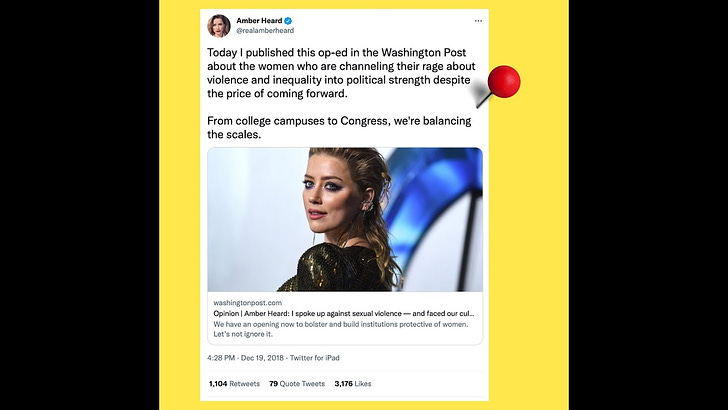



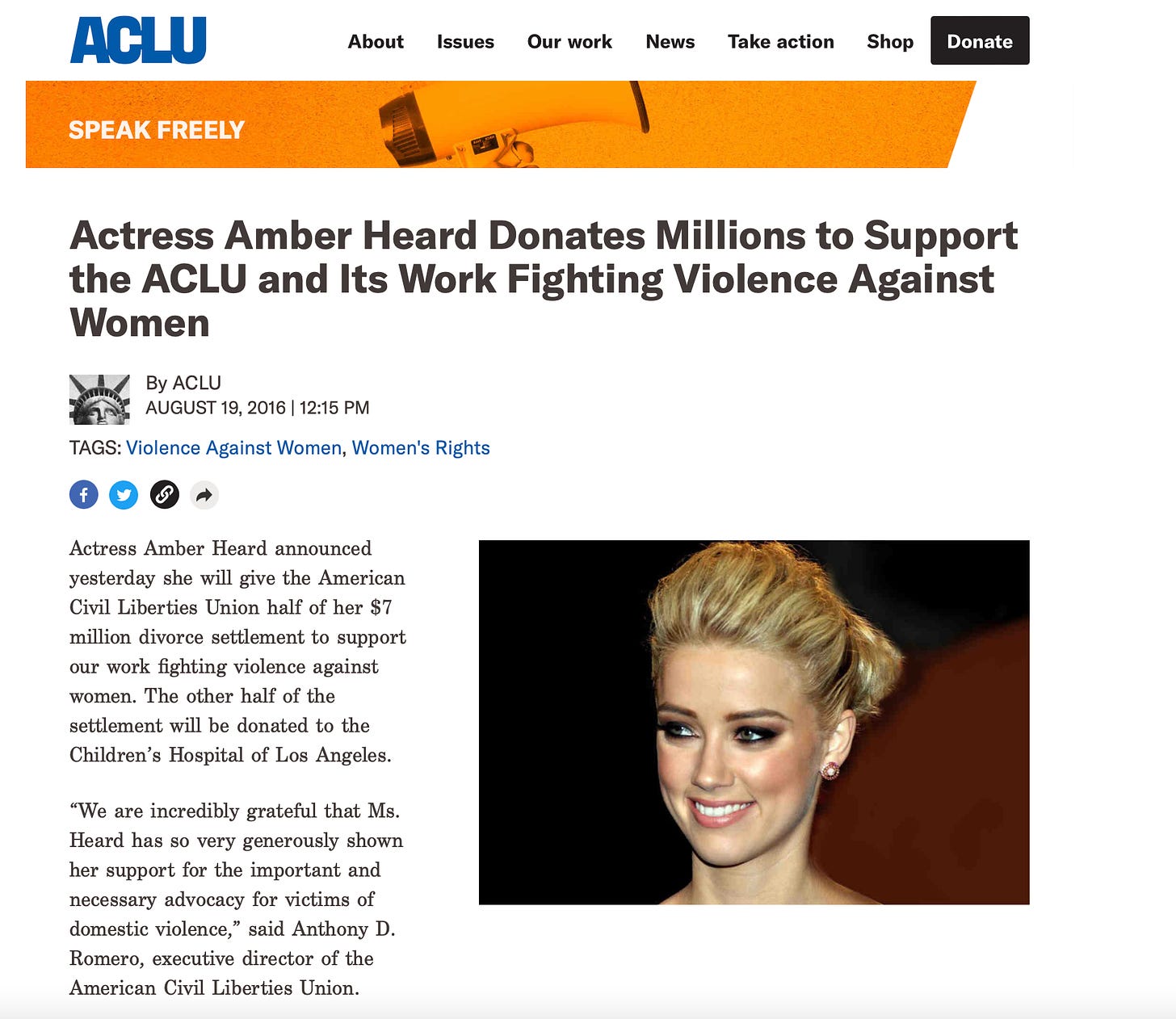
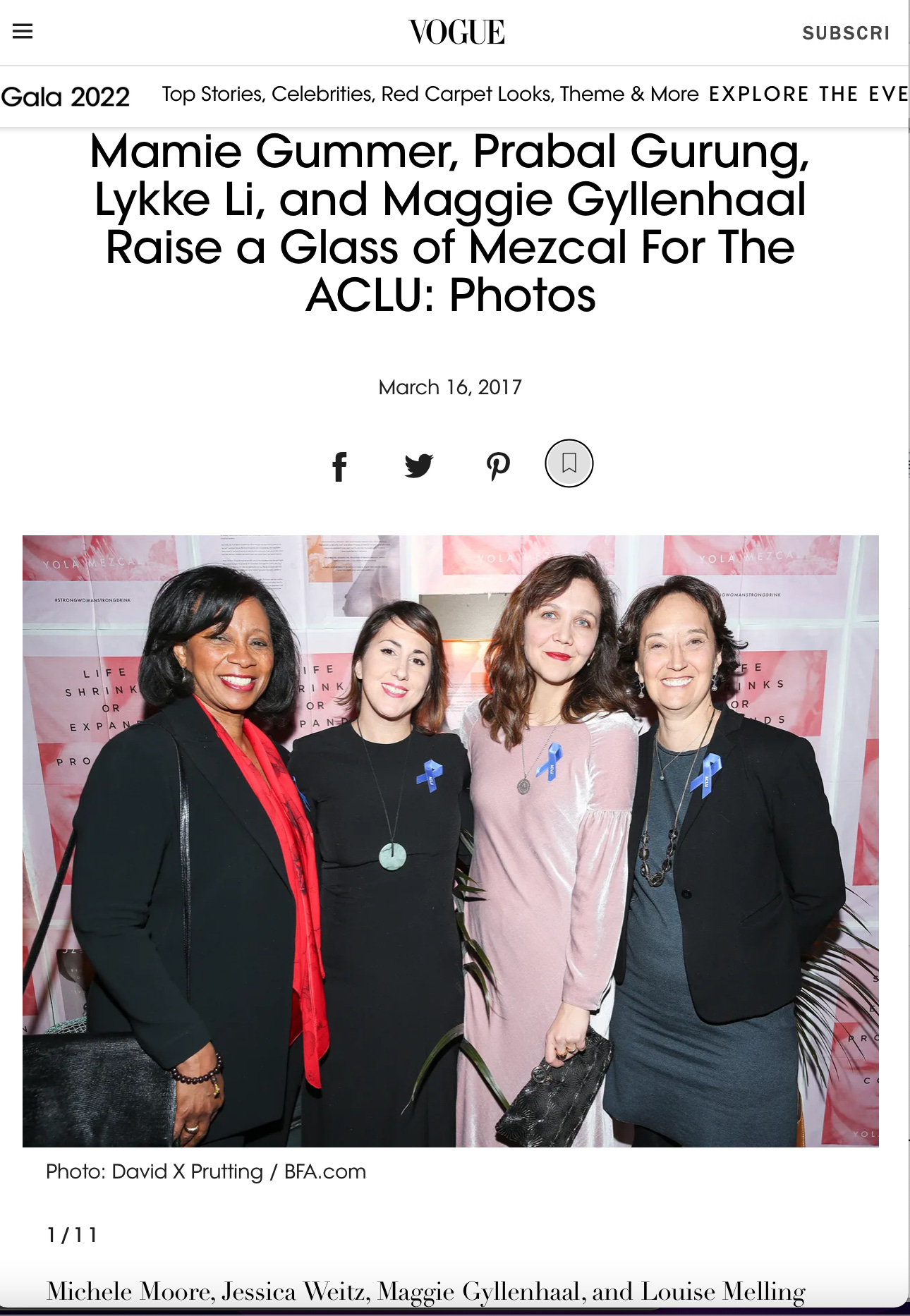
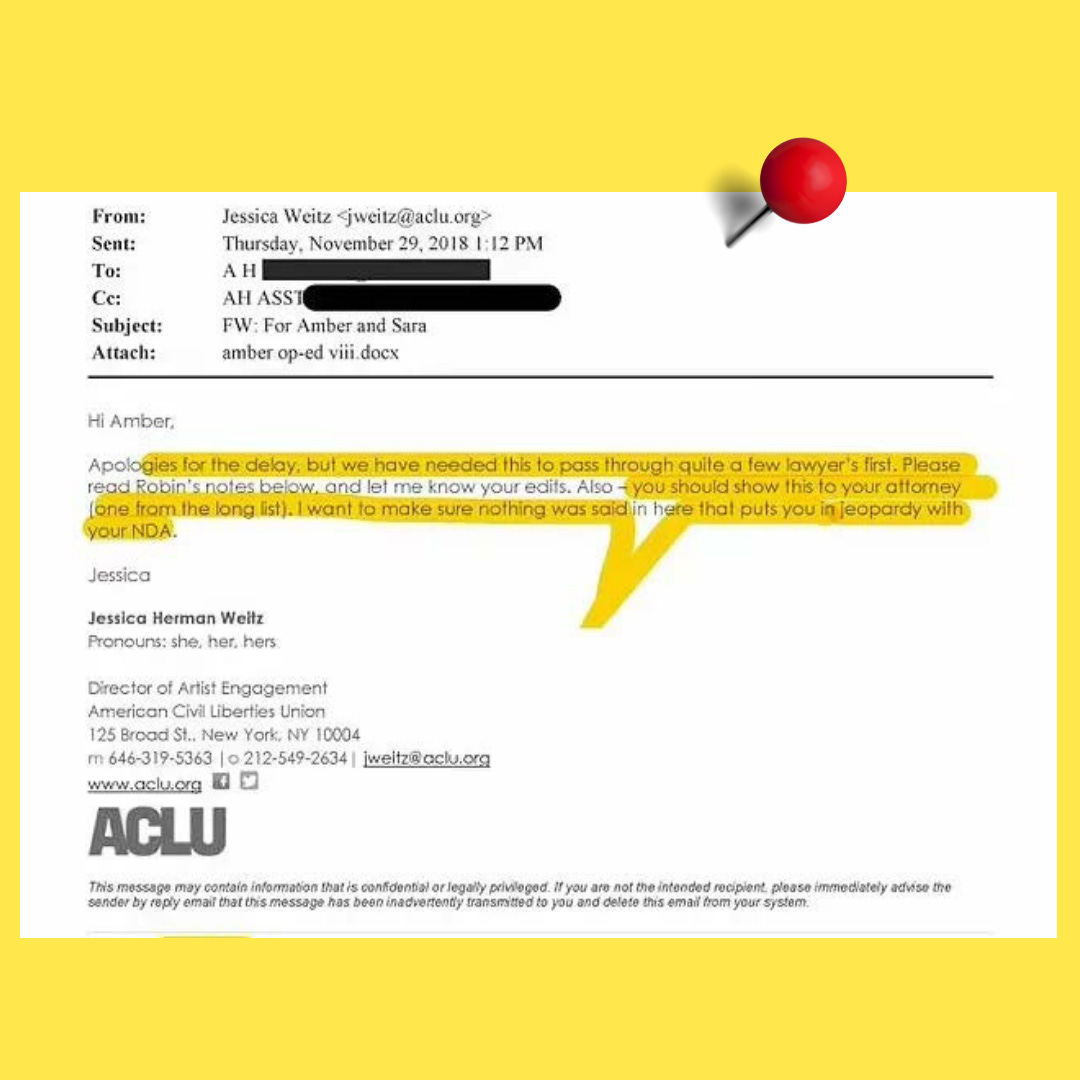

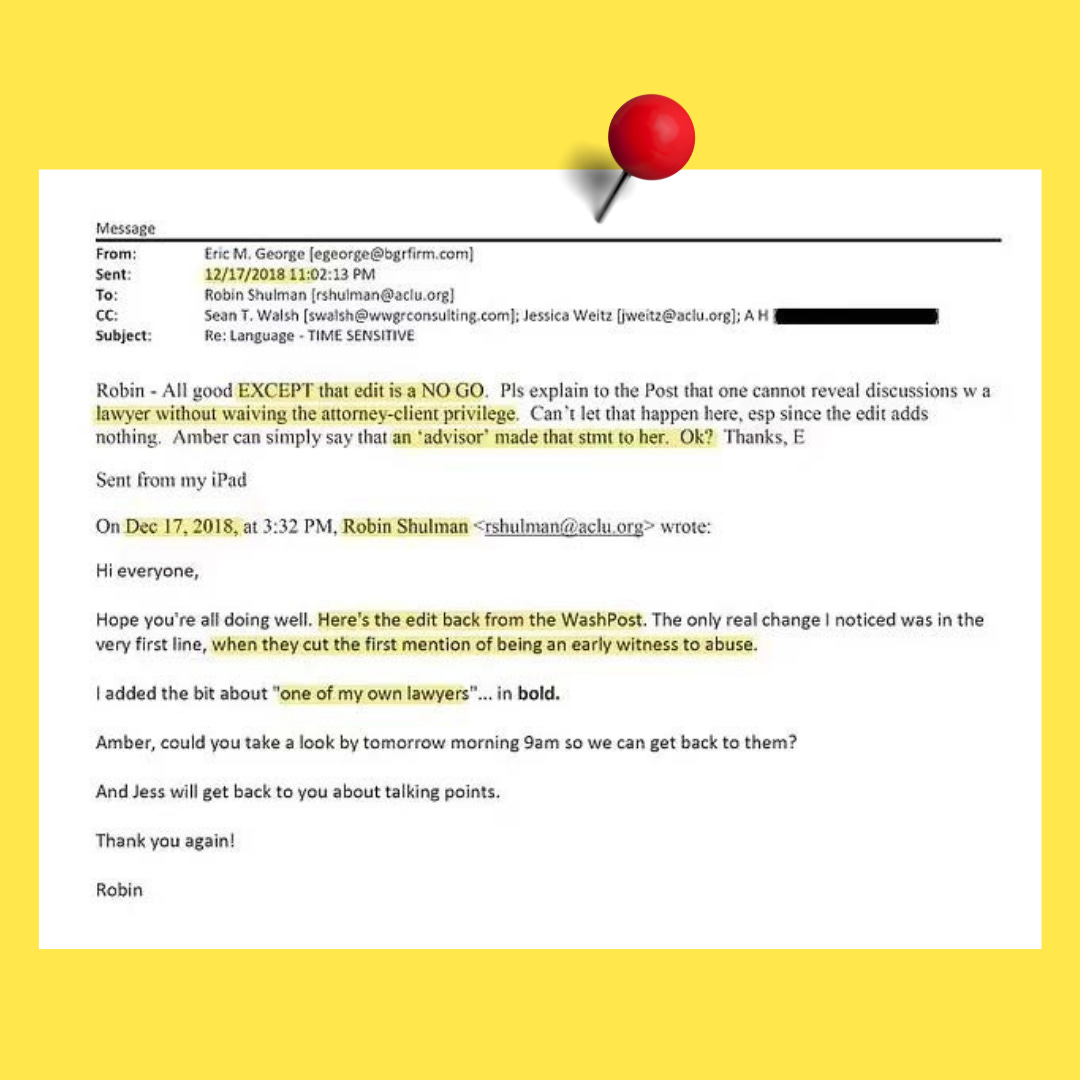
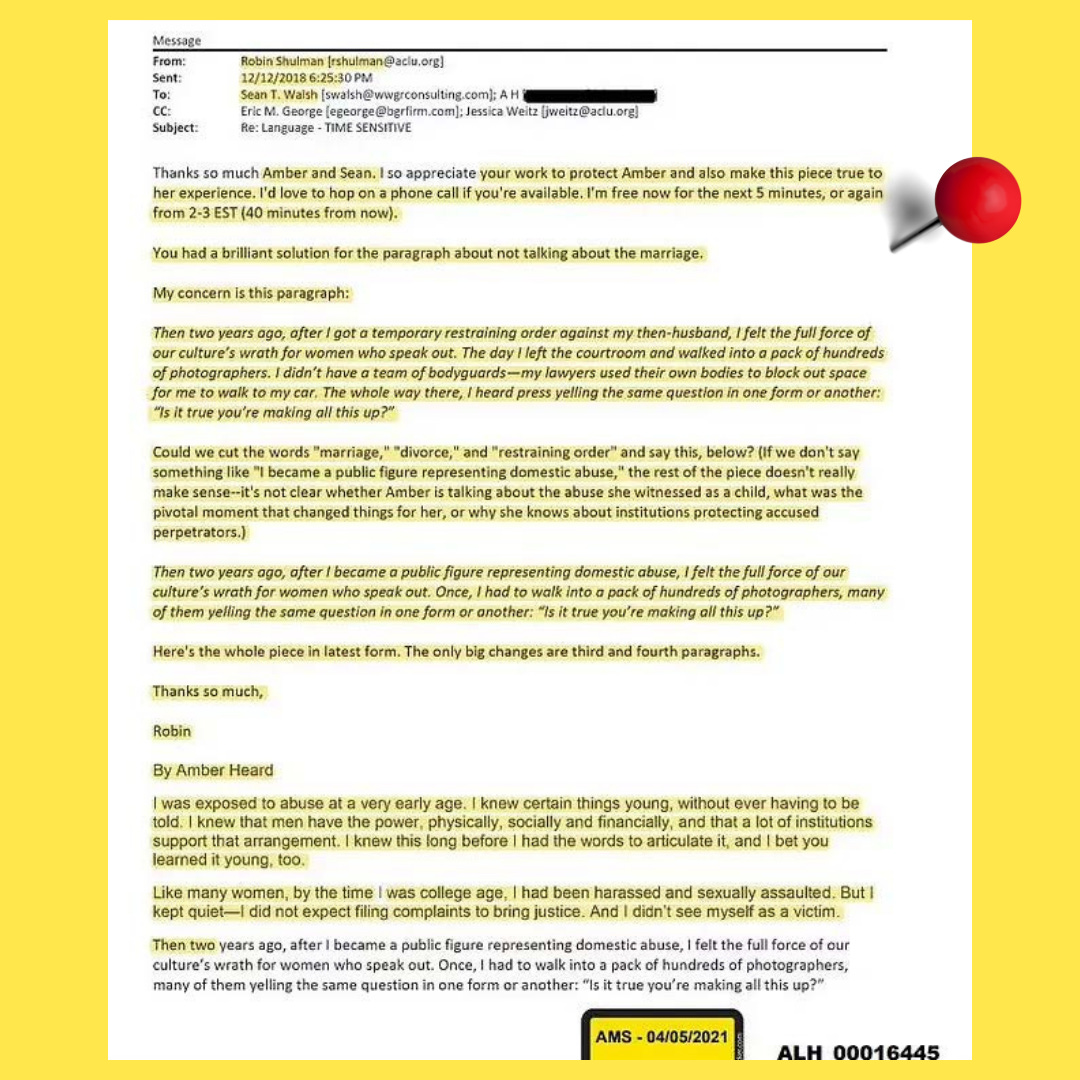
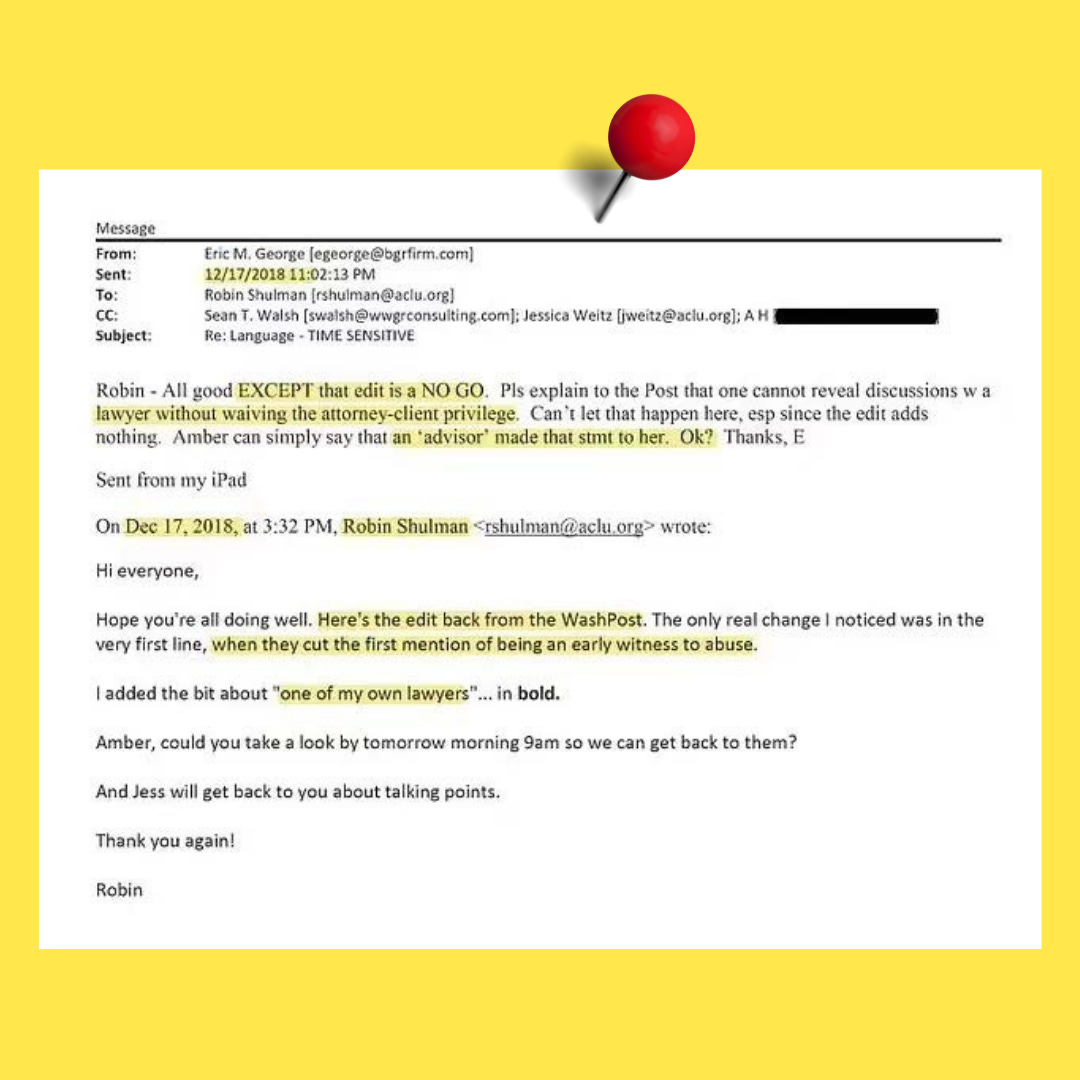
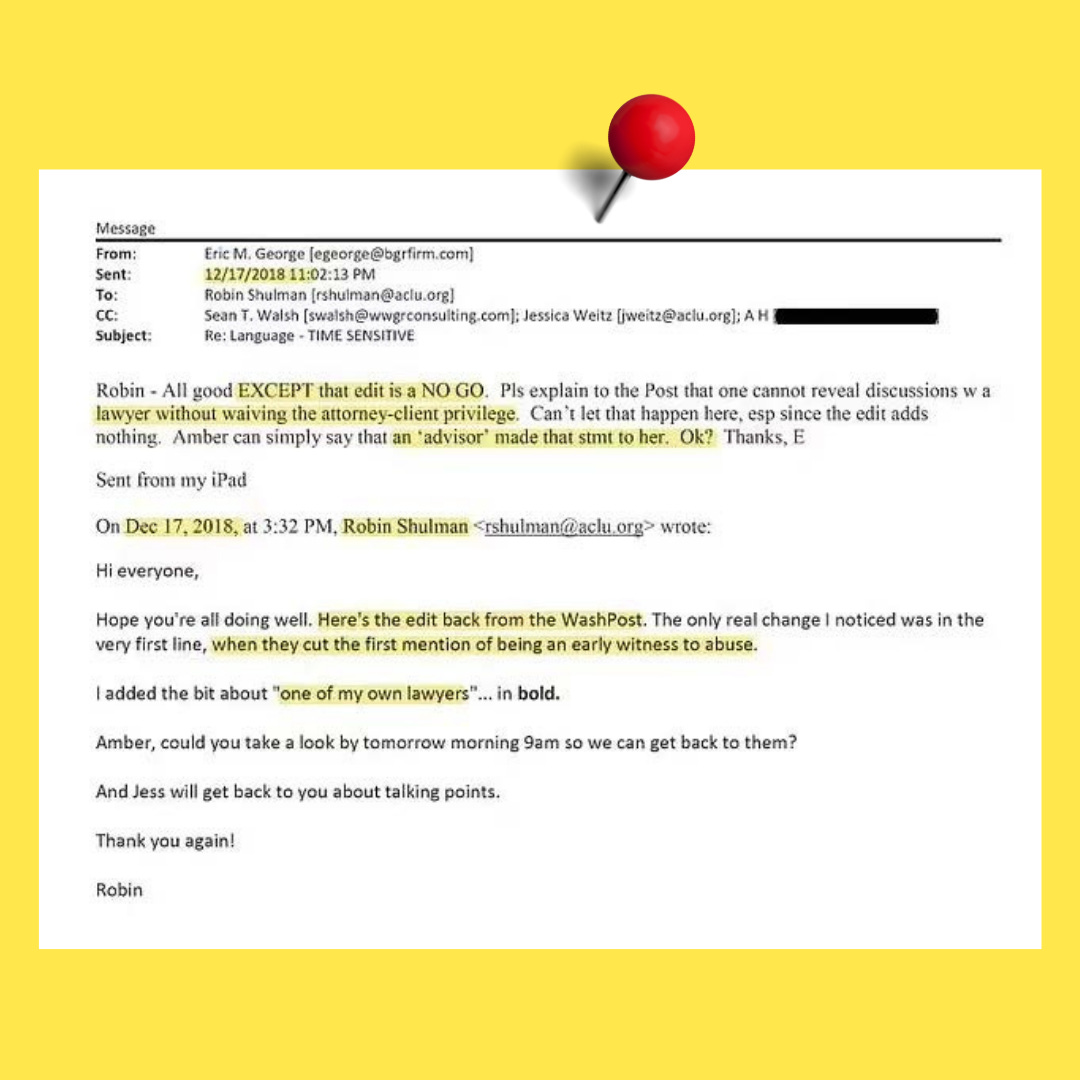
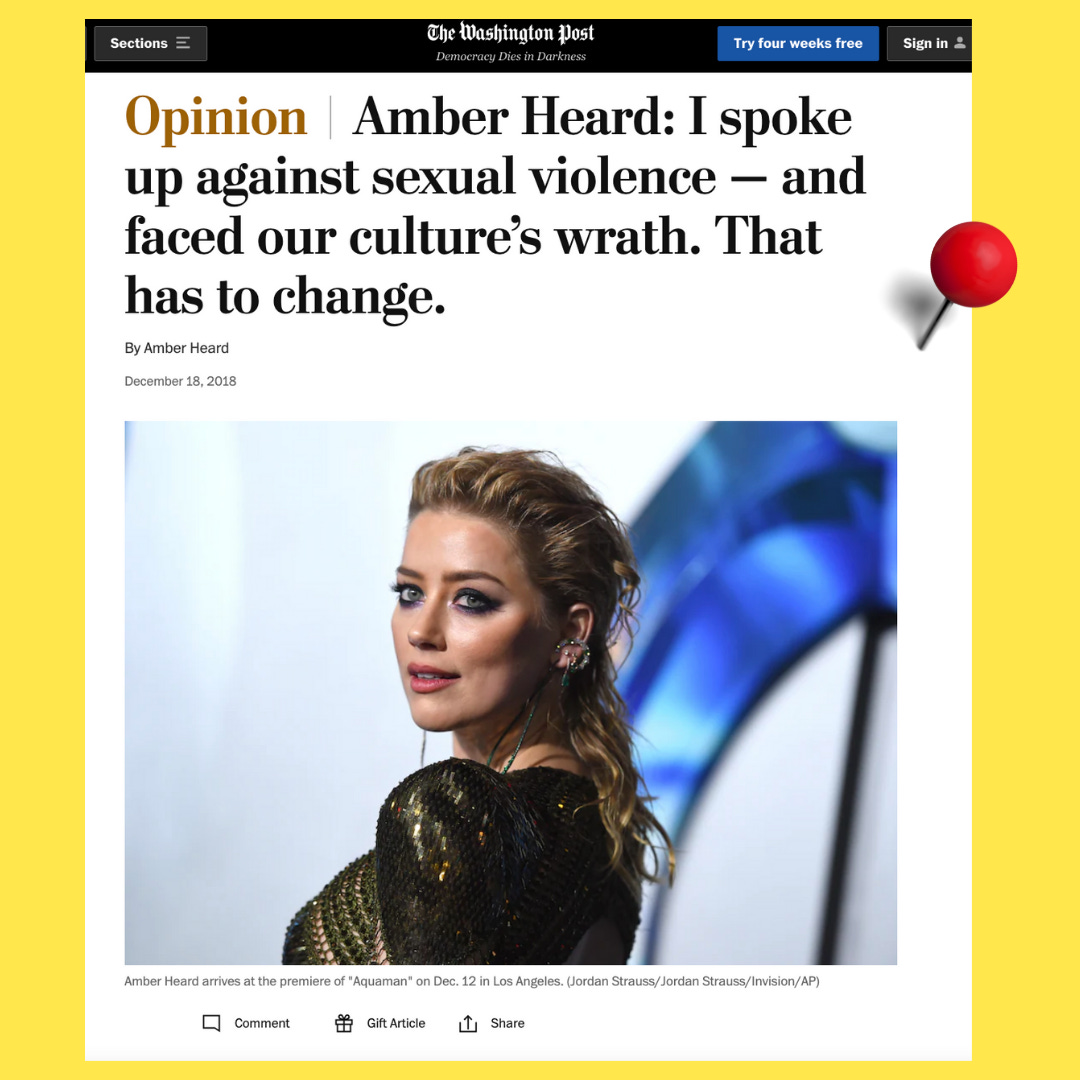
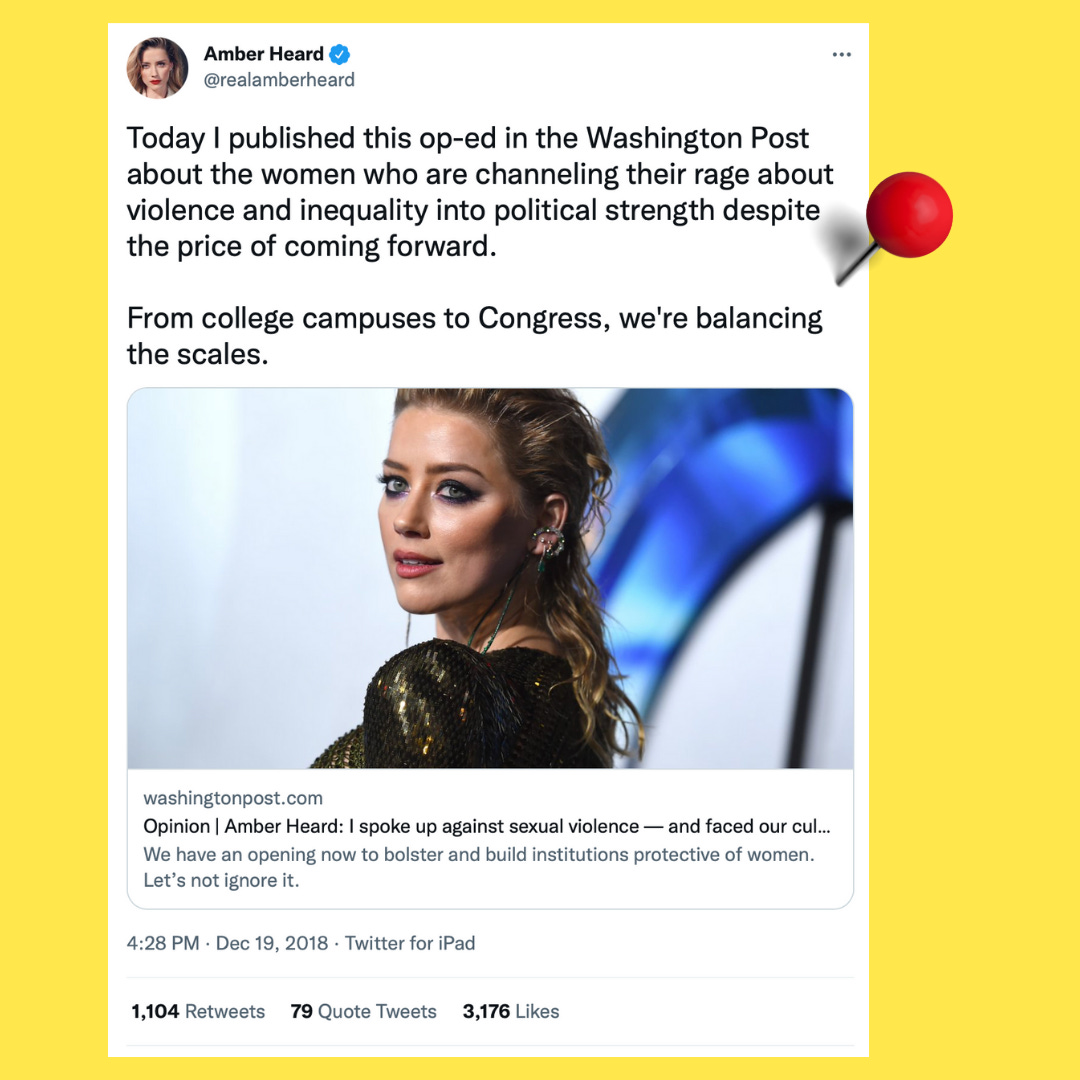
There is so much more to this story. The Sun owned by NGN which is part of the Murdock empire was sued when Johnny Depps phone was hacked while is daughter (a young child at the time) and during the filming of Sweeny Todd was seriously ill in hospital they hacked his phone to find out he was entering the hospital through the staff entrance and even found out the details of her illness, which he was doing his best to keep private. He won back then Also apparently Murdock owned the channel that was screening 21 Jump street and Johnny did not want to be in the series anymore When he quit the show failed causing the channel to loose a lot of viewers. Murdock had his own agenda in this. The Sun now is still trying to portray Johnny Depp in a bad light to this day. Also the Judge in the UK trial was corrupt as he had connections with Rupert Murdock.
Such a well written piece..kudos..